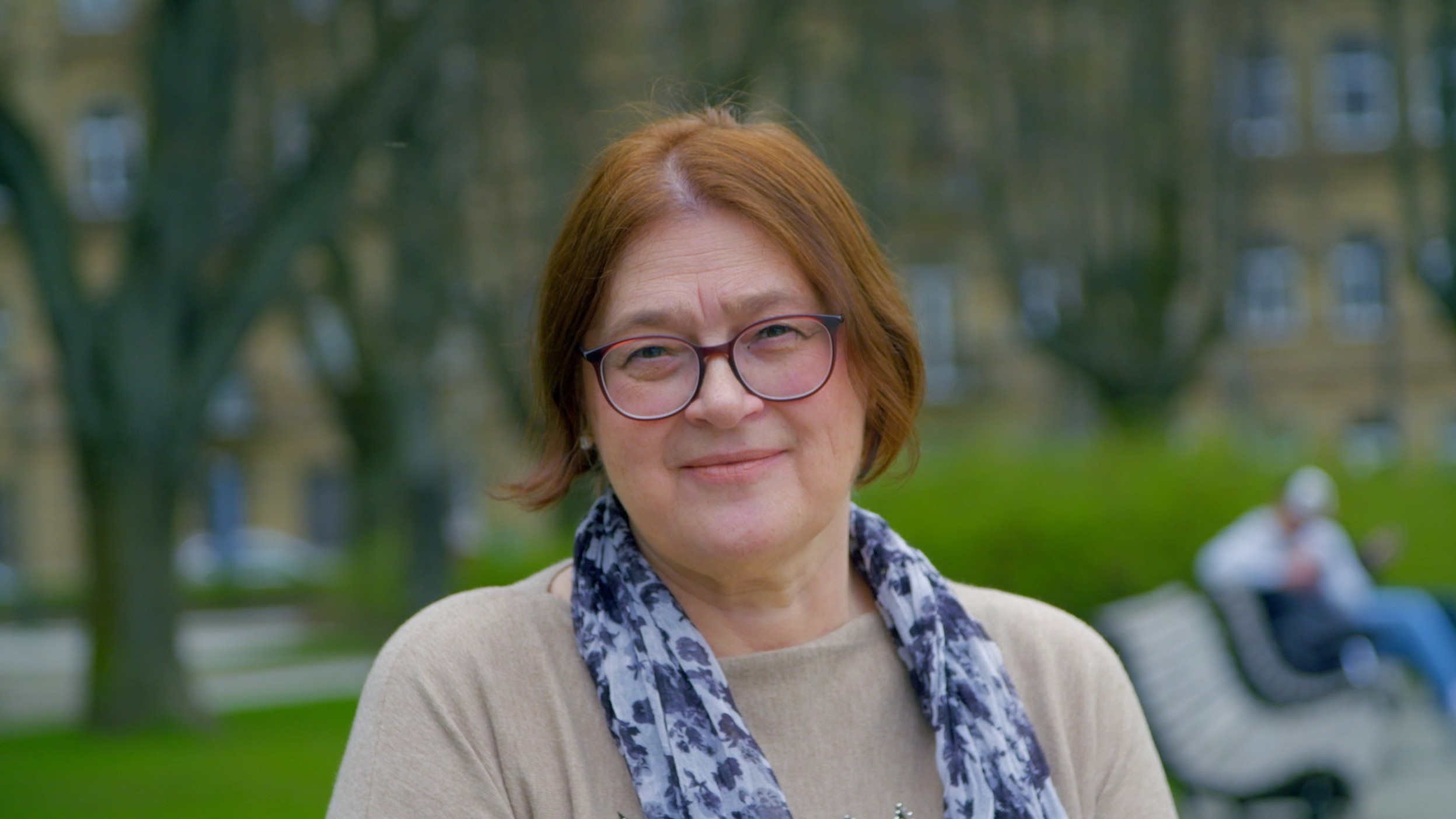
Authors: Jurga Bakaitė (LRT.lt) and Elena Reimerytė (BENDRA.lt)
Clinic Inquiry Calls: Aistė Kalčytė (BENDRA.lt)
Vilnius, the capital of Lithuania, is often hailed as a hub of progress and opportunity. Recognized as one of the “happiest countries in the world” for young people by the World Happiness Report, the city boasts a vibrant tech scene and a thriving cultural landscape, making it a top destination for those under 30.
Yet, beneath this cheerful facade lies a troubling reality. For many women, Lithuania’s so-called “progressive” capital conceals significant barriers to basic healthcare. Despite the legalization of medical abortion—a victory often celebrated as a human rights milestone—access to this service often remains obstructed by restrictive policies and bureaucratic red tape. These challenges suggest the enduring influence of anti-abortion forces, casting a shadow over the city’s promise of freedom and progress.
 Dalia. / Snapshot from a video by E. Reimerytė
Dalia. / Snapshot from a video by E. Reimerytė
A Broken System: Personal Stories of Frustration
When Dalia’s pregnancy test came back positive, she was overwhelmed, dropping to the floor in shock. The next day, she visited a doctor to confirm the result and immediately expressed her intent to terminate the pregnancy with medication, a method that had already been legal in Lithuania for six months.
“My initial reaction was complete panic,” Dalia, a Vilnius resident, recalls. She was certain she didn’t want to continue the pregnancy.
Stories like Dalia’s are common, as reported by BENDRA.lt, where women describe circumstances like unplanned pregnancies, divorce, financial struggles, lack of health insurance, and, in some cases, assault, all driving them to seek pregnancy termination. Like Dalia, many want to see a doctor promptly but encounter numerous obstacles in Lithuania’s healthcare system.
Although medical abortion has been legal in Lithuania for over a year, women frequently report—often in private online communities—that accessing the service remains nearly impossible.
Kristina (name changed for privacy) had a similar experience while trying to help a friend find a private clinic for a medical abortion. Nearly a year had passed since the Minister of Health, Arūnas Dulkys, had legalized the procedure, yet Kristina had to repeatedly assure clinic staff that the service was, in fact, legal.
“I called at least four clinics. I had to correct them, explaining that the new law had been in effect since January. They kept insisting the service was illegal, questioning why I was asking, or telling me they didn’t offer it,” she recalls.

“I called at least four clinics. I had to correct them, explaining that the new law had been in effect since January. They kept insisting the service was illegal, questioning why I was asking, or telling me they didn’t offer it,” she recalls.
Dalia, meanwhile, discovered her pregnancy in the sixth week, and time was running out. She visited multiple doctors in hopes of accessing a medical abortion. In Lithuania, medical abortion is only allowed up to nine weeks, so each delay heightened her stress and fear. Due to mounting health concerns and lost time, Dalia ultimately had to undergo a surgical abortion.
She expressed frustration with the system, pointing out the irony that medical abortion had already been legalized. “My greatest shock and fear was that I might not be able to get the abortion. Time was slipping away, and I had no idea when, or if, I would succeed," Dalia reflects, dismayed at the difficulty of accessing the care she needed and the time wasted.
Only 6 Pharmacies in the Country Stock Both Drugs
Access to the necessary medication is another major hurdle for women seeking a medical abortion in Lithuania. Patients are required to purchase the medication themselves from a pharmacy, but at the time of writing this article, only six pharmacies in the entire country currently stock both mifepristone and misoprostol, the two drugs required for the procedure. While pharmacies can technically order and ship these medications upon request, this process causes additional delays, adding to the anxiety and stress for women seeking a timely abortion. Both patients and doctors have reported challenges in navigating this system.
In countries such as the United Kingdom, Estonia, Finland, and Sweden, most women seeking an abortion opt for a medical procedure due to it’s convenience and privacy. However, in Lithuania, data from the State Drug Control Service show that only 10-30 sets of abortion pills are purchased monthly, a fraction of the approximately 200 abortions performed each month across the country. This suggests that surgical abortions remain the default in Lithuania, largely due to the limited availability and awareness of medical abortion options.
Despite these limitations, interest in medical abortion is increasing, reflected in the recent rise in sales of these medications. Many doctors note that medical abortion is particularly preferred by women in smaller towns, as it offers privacy and avoids the need for a large medical team or surgical intervention.
 Snapshot from a video by E. Reimerytė
Snapshot from a video by E. Reimerytė
Dr. Birutė Paškevičienė, one of the experts involved in drafting Lithuania's recommendations for medical abortion, works in Panevėžys, the country’s fifth-largest city. However, she receives frequent requests for help from women in nearby towns like Šiauliai and Kėdainiai, where medical abortion services are even more limited.
“In my city, most doctors don’t perform medical pregnancy terminations. I get flooded with calls, not just from my city but from neighboring towns as well, asking for help,” Paškevičienė explains, emphasizing the extent to which women must go to find accessible care.
Dissuasion as a Barrier: The Emotional Toll of Seeking Abortion Care
For many women interviewed by BENDRA.lt, one of the hardest parts of seeking an abortion in Lithuania was dealing with doctors' attempts to dissuade them, even after they had already made up their minds.
In Lithuania, it is common for doctors to try to persuade women against both medical and surgical abortions. Last year, Lithuania’s parliament considered a proposal to make "crisis pregnancy consultation" mandatory and state-funded for women seeking abortion. This pre-abortion counseling, intended to discourage termination, reflects the pervasive influence of anti-abortion sentiment in healthcare settings.
Experts argue that Lithuania urgently needs ethical guidelines for healthcare providers to ensure respectful, non-coercive communication with women seeking abortion care. The absence of such guidelines has left many women feeling unsupported, if not manipulated, in their interactions with doctors.
For example, Indrė (name changed by BENDRA.lt), who sought an abortion, was presented with an ultrasound photo of the embryo—despite not requesting it. A doctor suggested that it could be “the first photo in her family album” and sent her home to reconsider her decision, even recommending prenatal vitamins in case she changed her mind. This experience took place at a private clinic in Vilnius, which Indrė turned to after being dismissed by staff at a public institution when she mentioned wanting an abortion.
"I think that if a woman comes to a clinic, she should be provided with the service she requests and pays for, rather than being manipulated. A woman has the right to make decisions about her own body and life," Indrė asserted.
Dalia reflected, "Why should my options even matter to them? I didn’t want the pregnancy—that’s all there was to it." Her stress was only heightened by the unpredictability of doctors' personal views on her choice.

Dalia, who also decided to have an abortion, shared her anxiety about how doctors might react, fearing they would refer her to a crisis pregnancy center—a pro-Catholic organization known for trying to dissuade women from terminating pregnancies. A nurse even questioned her ability to raise a child, asking if she had the "possibility" to give birth and care for it. Frustrated, Dalia reflected, "Why should my options even matter to them? I didn’t want the pregnancy—that’s all there was to it." Her stress was only heightened by the unpredictability of doctors' personal views on her choice.
Ieva, from Vilnius, recounted an emotionally distressing experience at the emergency room when she sought care for heavy bleeding after taking abortion medication. She described how the doctor’s attitude shifted upon learning of her recent abortion, with the doctor’s tone becoming judgmental and dismissive. "From now on, it will only hurt more, and everything will fall out in lumps," she was told, with no concern for her emotional state. “Patients need reassurance and information, not more stress,” Ieva explained, underscoring the emotional toll of seeking care in a judgmental environment.
Indrė, who sought an abortion, recalled: "They gave me a photo of the embryo and said that maybe it will be the first photo in your family album."
A Test of Access: Challenges in Finding Medical Abortion in Vilnius Clinics
Even in Vilnius, where some of the most advanced clinics operate, accessing medical abortion remains a struggle. In an experiment conducted by BENDRA.lt, researchers investigated what a woman seeking a medical abortion in the capital might face.
The BENDRA.lt team contacted 14 randomly selected medical institutions in Vilnius, including public polyclinics, asking about appointment availability for a medical abortion. Surprisingly, only four clinics confirmed they offered the service and allowed appointments to be scheduled. This is a stark contrast given that Vilnius has 119 licensed facilities authorized to provide abortion services.
The responses from other clinics varied. Some staff claimed ignorance of the service’s legality, others suggested it was still illegal, and several outright refused to perform the procedure without a medical indication. Among these were well-known private clinics in Vilnius, typically known for their range of high-quality medical treatments.
One clinic receptionist noted, “Not all doctors here agree to prescribe the pills, only Dr. X… I don’t know why, it’s the doctor’s choice.”

One clinic receptionist noted, “Not all doctors here agree to prescribe the pills, only Dr. X… I don’t know why, it’s the doctor’s choice.”
In some clinics, no doctors perform abortions unless medically indicated. Receptionists clarified that this was either clinic policy or based on doctors’ personal beliefs. In state polyclinics, the barriers were even greater. For example, one clinic offered the next available appointment two months later—well past the timeline for a medical abortion, which is allowed up to nine weeks of pregnancy.
At the Karoliniškių Polyclinic, which serves the western part of Vilnius, abortions upon a woman’s request are not performed. The same is true in other cities, including Klaipėda, Alytus, and Šiauliai, where private clinics often remain the only option. Polyclinic representatives cited the Minister’s order, which allows doctors to exercise conscientious objection if no medical risk is present.
Doctors also noted that drug availability posed a major obstacle. Although medical abortion was legalized in early 2023 and clinical guidelines followed two months later, the medication only became available by autumn. This delay was due to lengthy drug registration and the manufacturer’s hesitation about potential demand in the Lithuanian market.
Obstetrician-gynecologist Rita Banevičienė recalled, “Why isn’t the process as smooth as it should be? It was rushed. The law took effect on January 1, 2023, and even I was surprised by the announcement on television. Women began seeking services, but we weren’t sure how to proceed because the medication wasn’t available.”
This investigation raises pressing questions: Why is this safer, scientifically supported method struggling to gain traction in Lithuania, and how can clinics expected to provide it remain unaware or unwilling?
 Snapshot from a video by E. Reimerytė
Snapshot from a video by E. Reimerytė
Here’s how medical abortion typically works according to the World Health Organization (WHO) and other medical sources:
In Lithuania, medical abortion is allowed up to nine weeks of gestation. The process involves taking two medications:
-
Mifepristone – This medication is taken first and blocks progesterone, a hormone essential for sustaining a pregnancy. WHO guidelines recommend a single 200 mg dose taken orally.
-
Misoprostol – Taken after mifepristone, usually within 24 to 48 hours, this medication induces uterine contractions to help expel the pregnancy. WHO guidelines suggest an 800 mcg dose, administered either buccally (between the gums and cheek), sublingually (under the tongue), or vaginally.
Both medications are regarded as safe and effective alternatives to surgical abortion. WHO also supports the use of telemedicine for medical abortions up to 12 weeks in settings where in-person visits are not possible, and encourages allowing non-specialist healthcare providers to assist with medical abortions when appropriate. These adjustments aim to make the process more accessible and reduce administrative burden, aligning with the practices of other countries like the United Kingdom
Lithuania’s Stricter-Than-WHO Abortion Guidelines Create Barriers
In comparison to the latest WHO abortion care guidelines, Lithuania’s regulations appear unusually restrictive, creating significant hurdles for both patients and doctors. Lithuanian doctors report that the current system burdens their workload beyond regular hours and creates unnecessary bureaucratic obstacles.
For example, in Lithuania, an in-person clinic visit and ultrasound are required both to determine gestational age and to confirm the termination afterward. However, WHO guidelines suggest that early medical abortions do not require an ultrasound at all, and that a follow-up visit is only necessary if requested by the patient. These guidelines are also reflected in the practices of the Royal Society of Obstetricians and Gynecologists in the United Kingdom and in official drug information leaflets.
The WHO also encourages telemedicine for early medical abortions (up to 12 weeks) and recommends allowing a wider range of healthcare professionals to prescribe abortion pills. In Lithuania, only obstetrician-gynecologists are allowed to issue prescriptions, and patients are required to visit a clinic in person. Despite the availability of pregnancy tests that allow women to estimate the duration of their pregnancy, current regulations prevent doctors from prescribing abortion pills unless the patient can attend a follow-up visit.
The Lithuanian Society of Obstetricians and Gynecologists faced significant pressure while developing the national recommendations for medical abortion care, including input from anti-abortion advocates. Dr. Vytautas Klimas, the lead author of the abortion care recommendations in Lithuania, admitted to BENDRA.lt that some experts in the working group opposed abortions and pushed for stricter regulations.
“It took almost a year to finalize the recommendations. Our group had more than 10 people, and it was a compromise. Some wanted reserved guidelines, while others pushed for more advanced ones. In the end, it turned out the way it did,” he explained.
Dr. Klimas explained that regulations from the WHO, the United Kingdom, Canada, and the United States were reviewed during the drafting process. The consensus reached was that Lithuania’s guidelines should be stricter than international standards rather than more lenient. Notably, Lithuania's recommendations rely on the 2019 WHO guidelines, bypassing the most recent 2022 version.
"Public organizations and anti-abortion advocates... there were many interests," Klimas shared, describing the complexities and competing influences that shaped the final regulations.
 Snapshot from a video by E. Reimerytė
Snapshot from a video by E. Reimerytė
Navigating Bureaucracy: Challenges for Both Patients and Doctors
Doctors in Lithuania report that the abundance of required procedures complicates the abortion process, creating challenges for both medical professionals and patients. Dalia, a patient, recalls the confusion she faced when her doctor seemed uncertain about the procedure: “The doctor was confused: I need to see what the procedure is and where you need to go. I didn’t feel very confident," she remembers.
The administrative burden further intensifies this complexity. For some medications, doctors are required to issue three separate prescriptions—one in the online system a nominal prescription, and a printed version—adding an extra layer of bureaucracy. The initial unavailability of the medication, which deterred some doctors from prescribing abortion pills, continues to frustrate patients and healthcare providers alike. One obstetrician-gynecologist remarked, “People come to us knowing these options exist, but we can’t offer them the help they need.”
Legal restrictions in Lithuania significantly limit both who can administer abortions and where they can take place. According to the Minister’s order, only obstetrician-gynecologists (ob-gyns) are authorized to prescribe medication and conduct consultations for abortions. This contrasts with WHO guidelines, which allow qualified healthcare providers without ob-gyn credentials to manage most medical abortion cases.
Moreover, Lithuania’s Penal Code imposes strict penalties: authorized doctors risk up to two years in prison for performing a surgical abortion outside a licensed facility, while unauthorized individuals face up to four years of imprisonment. These laws, originally designed with surgical abortions in mind, are the only explicit mentions of abortion in the country’s legal system. However, they do not address medical abortion at all, leaving a significant gap in legal clarity.
This lack of specificity, combined with the harsh penalties, may discourage medical professionals from implementing medical abortion procedures, creating additional barriers to accessing reproductive healthcare.
This system’s complexity often leads to frustration among healthcare providers. Vilma Vasjanova, head of the Department of Obstetrics and Gynecology at Šeškinės Polyclinic, explains that patients often expect medical abortion to be simple, assuming it only involves taking two pills. However, staff must explain the lengthy legal requirements, often needing to show the Minister’s order to justify the process. Patients are required to undergo blood tests and health reviews for contraindications—steps not mandated by WHO guidelines. “You must constantly keep in touch with the patient,” Vasjanova adds. “I give everyone my email and ask that we write to each other every day. I want to know how they feel and how much they bleed.” This daily communication typically lasts two to three weeks per patient.
Patients from remote areas face additional challenges, as some doctors work limited hours and cannot monitor progress regularly. Dr. Paškevičienė highlights the difficulties for these patients: “One of my colleagues only works once a week and travels to Panevėžys. She says she cannot follow up with patients or monitor their progress regularly. Where will they go then? I tell them that emergency services are still available, but patients continue to call, and we end up managing them outside of working hours.”
Some doctors speculate that private clinics may be disincentivized from offering medical abortion due to low profit margins. Patients typically pay only for consultations and must purchase medication separately, costing approximately 200 EUR and not covered by compulsory health insurance. Surgical abortions, in contrast, are more involved and costly, contributing more significantly to clinic revenue. In public healthcare institutions, surgical abortions are usually cheaper, and since patients pay for elective abortions themselves, this price difference may influence their choice between medical and surgical options, though no concrete evidence supports this theory.
 Snapshot from a video by E. Reimerytė
Snapshot from a video by E. Reimerytė
Conscientious Objection and Institutional Objection
Despite abortion being legal in Lithuania, both individual doctors and entire clinics refusing to provide abortion services—whether medical or surgical—pose significant obstacles for women seeking care. Legislation allows obstetrician-gynecologists to refuse to perform abortions on moral or religious grounds unless the woman’s life is at risk. However, no legal provision exists to address situations where no doctors in a facility are willing to perform the procedure. As a result, many women waste time traveling between healthcare institutions, unaware of each clinic’s stance until they arrive. This issue was highlighted in BENDRA.lt’s stories and experiments, which documented how women frequently encounter clinics that don’t clearly disclose their policies.
This is particularly evident at Vilnius’s Karoliniškių Polyclinic, where doctors from other polyclinics report an increase in patients seeking referrals for abortions. Although public opinion surveys show support for a woman's right to choose, there is no data on how many doctors in Lithuania refuse to perform elective abortions. Furthermore, in the Seimas (parliament), several legislative attempts have been made to restrict or ban abortion in Lithuania."
The majority of doctors interviewed by BENDRA.lt expressed understanding toward their colleagues' right to conscientiously object, even though it results in added work for those who do perform abortions. “You know, I get no pleasure in terminating pregnancies, especially given the current drop in our birth rates,” said Dr. Banevičienė. “But when you consider a woman’s situation, you have to do it.”
Other doctors voiced the inner conflicts they faced. Dr. Paškevičienė recalled seeking guidance from a priest to cope with her feelings. "I even went to a priest for confession. I asked, ‘Am I a bloodsucker or what?’ The priest told me, ‘This is your job, your specialty. You don’t need to crucify yourself.’”
One obstetrician-gynecologist, who preferred to remain anonymous, explained that although she knows how to carry out a medical abortion, she avoids it due to her beliefs. To sidestep this responsibility, she chose a position at a polyclinic that does not require abortions. “If you work in a department where abortions are performed, you have to do them. I chose not to work there,” she said.
Some gynecologists disclosed that they decline to perform abortions for patients who repeatedly return without using contraception. "Women don’t use birth control, and six months later, they come back for another abortion,” Dr. Paškevičienė explained. "As if contraception is supposedly harmful, but termination isn't? They come in tears, and even though I prescribed contraceptives before, they don’t buy it. I can tell from the electronic healthcare system that it hasn’t been purchased."
The Ministry of Health: Hands-Off and Unaccountable
The Lithuanian Ministry of Health declined to comment on the difficulties surrounding access to medical abortion, stating that since abortion is not covered by compulsory health insurance, the current ministerial order suffices to regulate the procedure. The Bioethics Committee, tasked with protecting human rights and dignity in healthcare, also refrained from commenting on the issue.
However, experts interviewed by BENDRA.lt stress that these shortcomings in abortion access reveal a critical human rights gap. Esmeralda Kuliešytė, head of the Family Planning and Sexual Health Association and a former obstetrician-gynecologist, emphasizes the Ministry of Health’s responsibility to address these barriers. She also criticized medical professionals for failing to apply pressure on politicians: “This is a woman’s right. Not everyone will end up needing this [abortion procedure]—probably a minority—but we see that the number of abortions is decreasing. However, access must be ensured for those who will need it,” Kuliešytė asserted.
One major issue is that many medical institutions in Lithuania do not clearly disclose on their websites whether they provide abortion services, leaving women to discover this only after meeting with a doctor. Kuliešytė warns that delays resulting from such "doctor-shopping" can have serious consequences, potentially pushing pregnant people beyond the legal window for abortion or even forcing them toward unsafe, illegal procedures. She described instances where doctors attempted to dissuade patients from abortion, calling such tactics “coercion”: “They don’t consider abortion to be a choice; the only option they see is childbirth. What kind of human rights are we talking about when we find institutional abuse? You go to a state institution and you experience abuse, condemnation, and intimidation,” she said.
“This is a woman’s right. Not everyone will end up needing this [abortion procedure]—probably a minority—but we see that the number of abortions is decreasing. However, access must be ensured for those who will need it,” Kuliešytė asserted.

Dr. Nathalie Kapp, advisor to the International Planned Parenthood Federation and contributor to WHO guidelines, emphasizes that international standards require that providers who conscientiously object must provide prompt referrals to ensure the patient receives timely care. “The WHO and organizations like FIGO... say that if you consciously object, you have the right to do that as a provider, but you have to provide prompt referral and ensure that the referral will deliver the care that the person needs and wants. This is really the only mechanism that can uphold medical ethics, patient safety, and human rights in the face of conscientious objection,” Dr. Kapp explained.
Dr. Kapp also criticized the compromise reflected in Lithuania’s medical abortion procedures, which deviate from WHO guidelines: “That doesn’t make much sense, because medical care should be evidence-based rather than a compromise on people’s personal values. The amount of research we have on the safety of early medical and surgical abortions is just astounding, and to not be responsive to that evidence is really not scientific at all.” She recommended that an international scientific body review Lithuania’s current abortion protocols.
Member of the Seimas Health Affairs Committee, Morgana Danielė, expressed concerns about the potential withdrawal of medical abortion drugs from the Lithuanian market if doctors continue to avoid prescribing them. "In the future, it may once again depend on political will," she warned, alluding to the long battle that led to the legalization of medical abortion in Lithuania. Though medical abortion has been a global standard for over 30 years, efforts to legalize it in Lithuania encountered significant resistance from conservative politicians and organizations.
Dr. Vytautas Klimas, an obstetrician-gynecologist who played a key role in legalizing medical abortion, notes that anti-abortion arguments among Lithuanian politicians remain unchanged: “As far as the Seimas is concerned, they've only tried to pass laws restricting abortion rather than making it more accessible... Many politicians still have outdated views—even presidential candidates. I listened to the debates and saw it firsthand,” he said.
Experts underscore that despite the legalization of medical abortion, reproductive healthcare remains underdeveloped. Lithuania still lacks a cohesive reproductive health policy, and the Government has no immediate plans to introduce one. As a potential solution, they propose a national website providing reliable information on contraception, preventive tests, and pregnancy termination. Such a resource could mirror Lithuania’s existing official website for mental health.
Reflecting on this gap, Kuliešytė noted, “As long as they don’t need the service themselves, women think everything is fine. But when they face the situation, they realize it’s not,” urging women encountering barriers to contact institutional administrators or the Equal Opportunities Ombudsperson.
One patient, Daiva, shared her experience of seeking a medical abortion only to find that the required medication was unavailable and the doctors she encountered lacked sufficient knowledge. Frustrated, she reached out to the Ministry of Health and was informed that no further regulations were forthcoming, as the ministerial order was deemed adequate. Daiva’s search for clarity led her to encourage other women to assert their rights: “In our society, we don’t talk enough about abortion—when someone might need it or what individual situations could look like,” she observed.
Kuliešytė also highlights a lack of awareness about contraception in Lithuania, where myths about contraceptive risks are widespread. “There is no [reproductive health] strategy, no programs. Where are we heading with this? No one knows. The Ministry of Health should be ensuring this... They always say it’s not the right time. But then, when is the right time?” she questioned.
 Snapshot from a video by E. Reimerytė
Snapshot from a video by E. Reimerytė
Conclusion: The Reality Behind the Image
While Lithuania, and Vilnius in particular, is often hailed as a progressive and dynamic place for young people, the reality for many women tells a different story. The gap between legal rights and practical access to abortion services exposes a healthcare system that is failing those who need it most. Until the government takes responsibility for ensuring access to legal abortion, women in Lithuania will continue to face unnecessary barriers and delays, putting their health and their rights at risk.
As long as these issues persist, Lithuania’s progressive image will remain just that—an image, divorced from the reality faced by women across the country.
This article was prepared by BENDRA.lt in cooperation with Lrt.lt






